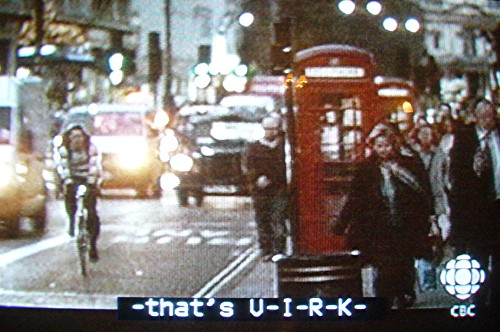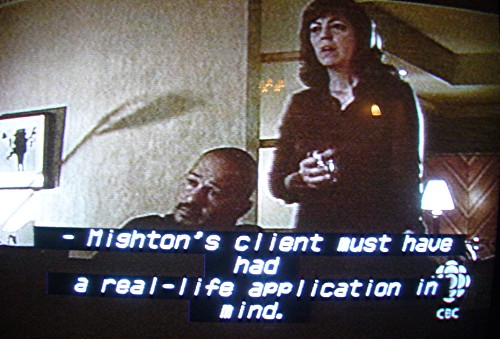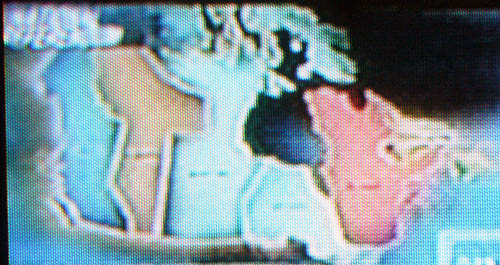

![Caption: [Laughing] [That's a good one]](Laughing.jpg)

(2008.03.30 19:26) The Trojan Horse was a CBC miniseries in two parts airing Sunday, 2008.03.30. (It’s the sequel to H₂O [2004].) I wrote a a superspecial liveblog of the show. (Why?)


![Caption: [Laughing] [That's a good one]](Laughing.jpg)

Let me run some of the first episode’s inconsistencies by you.
Fundamentally, the show rewrites its own history. H₂O closed with the Americans invading Canada and preventing an election – exactly intertextual with A Very British Coup. In The Trojan Horse, that invasion is not discussed; all we heard about was a previous Canadian “request” for U.S. troops to quell insurrection, and that came up only once.
Somehow we’ve gone from full-on American occupation (not a short-term operation at any time since Grenada) to being a sovereign nation again that is able to hold its own referenda.
After an invasion by a foreign power, a later near-50% vote to join that power would be an impossibility in any country in any era. I’ll come back to the vote totals later.
The map of the former Canada, as shown over the shoulder of the fake newscaster, seems less probable the more I look at it.

The state between B.C. and Ontario is Saskatchewan, not Alberta, according to a caption typed out by a Quebec Francophone on the basis of inaudible dialogue. This is nuts, as the Americans are hot for Alberta and cannot even spell Saskatchewan.
Either way, I don’t buy the idea that the western provinces would just extend their borders more or less arbitrarily northward. The three territories would become a single state. In fact, given that tiny Rhode Island and Delaware are individual states but enormous Alaska is too, there is no obvious reason not to preserve the existing provincial and territorial boundaries.
In any event, this gives the Americans the Northwest Passage. And what about native land claims?
It’s preposterous to imagine that Quebec (or, as Quebec captioners call it, Québec) would agree to join the United States – a country that cannot put a lid on its resentment of Spanish, let alone French. Bilingual product labelling (mostly a Quebec standard; federal laws require very little translation on a package) would disappear. French would not be permitted on the floor of the House of Representatives or the Senate. The USNA federal government would not be bilingual. Be real here.
I note that Jericho also got the question of devolved U.S. states quite wrong. After 23 nuclear bombs detonate, states east of the Mississippi remain the United States; those west of the river become the Allied States; and Texas remains independent. In reality, there would be at least seven states in that scenario – the east; the west; Texas; Hawaii; Alaska (immediately invaded by Putin); California; and Pacifica, an amalgamation of Oregon, Washington, and British Columbia. U.S. territories, like Puerto Rico, Guam, and Saipan, would declare independence immediately.
In the Horse₂O scenario, Quebec really would declare independence, a movement that would be crushed by the full weight of the U.S. armed forces. (Just watch me!) On Horse₂O, they’ve already amended the U.S. constitution; the government would have no qualms repealing the Posse Comitatus Act.
What happened to natives across the U.S., Canada, and Australia would happen to pure-laine Québécois: They’d be dispersed to English-speaking states and their language would be exterminated within five generations. Whether the Americans would notice the Francophones in Ontario and New Brunswick, and the vestigial hangers-on in other provinces, is a separate question.
There would be no unceremonious replacement of the Canadian flag with the Stars and Stripes over Parliament because Parliament would have been dissolved and the buildings mothballed.
Would the Canadian Armed Forces have to be retrained by the U.S. military? We’re going to send recruits to boot camp in North Carolina now?
At what point do Canadians stop calling themselves Canadian? Would this be like Kuwaitis calling themselves Iraqis or Tibetans calling themselves Chinese?
It is nuts to imagine a country of 32 million people represented by a mere 50 congressional representatives. Unfortunately, that scenario conforms to the U.S. standard of 600,000 people per congressional district. (And they have no qualms about assigning a single congressional representative to a huge area – Alaska has one representative. We do the same with many northern ridings.)
On the plus side, a takeover by the U.S. might finally put an end to the nonsense of having two MPs for Prince Edward Island.
There is no way that the results of a referendum would be exactly 51%/49%. “Quebec referendum,” you say. Sure. But in reality, there would be several places after the decimal point, first of all, and for any kind of secession vote, a supermajority would be required – at least two-thirds of all eligible voters. Voting would have to be compulsory, as it is in one of the world’s few true democracies, Australia.
If 49% of the population voted against takeover, that means half the country will seethe with rage for years. I say again: A 50–50 vote is a mandate for civil war, not unification.
So they’d still have gay equal marriage, right? Everywhere in the USNA, even Texas?